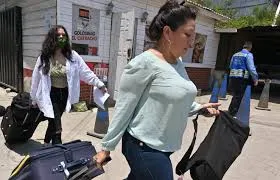On Monday, the United States repatriated 68 immigrants from Honduras and Colombia on a government-funded flight, marking the first instance of what the Trump administration refers to as voluntary deportations. In San Pedro Sula, a city in northern Honduras, 38 Hondurans, including 19 children, arrived on the charter flight. Each received a $1,000 debit card from the US government and the possibility of applying for legal entry into the US in the future.
US President Donald Trump has pledged to significantly boost deportations. Experts suggest that the self-deportation proposal will attract only a limited number of migrants who are already contemplating returning home, and it is not expected to generate widespread interest. This initiative coincides with highly publicized migrant detentions in the US and the transfer of several hundred Venezuelan migrants to a maximum-security prison in El Salvador. Kevin Antonio Posadas, originally from Tegucigalpa, had been living in Houston for three years and was already thinking about returning to Honduras when the Trump administration unveiled its proposal.
"I wanted to see my family and my mom," Posadas shared, noting that the process was straightforward. "You just apply through the CBP Home app, and within three days, you have it," he explained. The flight departed from Houston early Monday. "It's beneficial because you save on the flight cost if you plan to leave." Posadas mentioned that he wasn't worried about deportation and enjoyed living in the U.S., but he had been contemplating a return home for some time. He also expressed that he might eventually consider the U.S. government's offer for those who self-deport to apply for legal entry into the country.
In a statement regarding Monday's flight, US Homeland Security Secretary Kristi Noem said, “If you are in the country illegally, use the CBP Home App to manage your departure and receive financial assistance for your return. If you do not take action, you risk facing fines, arrest, and deportation, and you will be permanently barred from returning.” According to a statement from the US Department of Homeland Security, an additional twenty-six migrants on the flight were returning to Colombia. Honduras Deputy Foreign Minister Antonio García announced that the Honduran government would also provide returning migrants with $100 in cash and an additional $200 in credit at a government-operated store that sells essential goods.
On Monday, among the migrants arriving voluntarily were four children born in the United States, according to García. He met the newcomers at the airport and reported that they expressed how challenging it had become to live in the US without the necessary documents for legal immigration or residency. They mentioned that conditions were becoming more hostile, and they were afraid to go to work. Despite this, Wilson Paz, the director of immigration in Honduras, noted that the number of Hondurans deported from the US this year is lower than last year's figures.
According to Paz, approximately 13,500 Hondurans have been deported from the U.S. this year, compared to over 15,000 by the same time in 2024. He does not anticipate a significant increase in this number, despite the intentions of the Trump administration. Some individuals may choose to self-deport, feeling that their time in the U.S. is coming to an end or facing increasing difficulties in finding work. “I don’t expect thousands of people to apply for the program,” Paz stated. “Our responsibility is to ensure they return in an orderly manner and that we provide them with support.”



